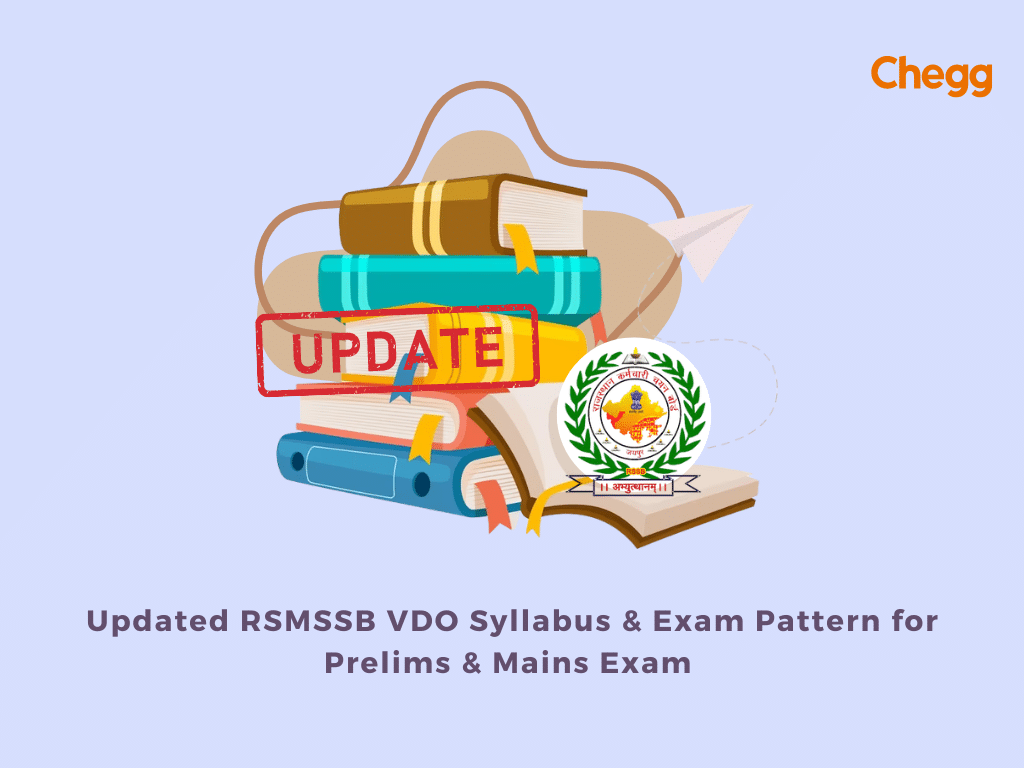
The RSMSSB VDO Syllabus 2025 is a vital resource for candidates preparing for the Rajasthan Subordinate and Ministerial Services Selection Board (RSMSSB) Village Development Officer (VDO) exam. Understanding the syllabus will allow you to focus on key topics and enhance your preparation. In this article, we provide a detailed, topic-wise breakdown of the syllabus, along with helpful preparation tips and answers to frequently asked questions.
We highly recommend thoroughly reviewing the entire RSMSSB VDO syllabus to ensure a well-rounded preparation for the 2025 exam. Make the most of available online resources and practice effectively.
With the right strategy and commitment, success in the exam is within your reach!

o qualify for the Rajasthan VDO 2025 post, candidates should have a thorough understanding of the Rajasthan VDO Syllabus 2025. Familiarity with the syllabus enables aspirants to grasp the subjects, topics, and nature of questions likely to appear in the examination. For a clearer overview, candidates can review the table provided below, which outlines the detailed syllabus.
| Topic | Sub-Topic |
|---|---|
| Language Knowledge | सामान्य हिन्दीउपसर्ग, प्रत्यय, संधि, समास, पर्यायवाची शब्द, विलोम शब्द, शब्द युग्म, अलंकारतत्सम-तद्भव, लोकोक्तियाँ, मुहावरे, एकार्थक शब्द, वाक्य शुद्धिलिंग, वचन, वाक्यांश के लिए एक शब्द, वर्तनी अशुद्धियाँवाक्य परिवर्तन, रिक्त स्थान पूर्ति |
| General English | Questions based on Grammar (Senior Secondary Exam Level), Multiple Choice Questions based on Paragraphs |
| Mathematics | Square roots and cube roots identification, Square and cube of integers, Conversion of decimal numbers, Conversion between fractions and integers, Percentage, profit & loss, average, ratio, simple and compound interest, time & work, Time and distance, mensuration, volume, area, shapes and their areas, Coordinate geometry, linear equations |
| General Knowledge | History of India and Rajasthan, Indian Constitution, Science and Technology, Current Affairs, Indian Economy, Budget, Planning |
| Geography | Geography of India and Rajasthan, Minerals, forests, water, agriculture, animal husbandry, industries, climate, Major rivers, lakes, dams, projects, Vegetation, climate change, environmental issues, Energy resources (conventional and non-conventional) |
| Knowledge of Agriculture | Major crops of Rajasthan, Agricultural marketing, Irrigation projects, Agriculture-based industries, Animal husbandry |
| History and Culture of Rajasthan | Rajasthan’s contribution to the freedom movement, Rajasthani culture, Folk deities, folk heroes, saints, Major fairs and festivals, Painting, architecture, crafts, dance, music, musical instruments, Language and literature |
| Basic Computer | Characteristics of Computers, What is a Computer (Definition, Uses, ROM, File System, Input Devices, etc.)Distinction between Hardware & Software, Operating System, MS-Office (MS Word, Excel, PowerPoint) |
You can also download the Syllabus PDF.

The subject weightage will be as follows:
| Subjects | Total Questions | Maximum Marks | Duration |
|---|---|---|---|
| General English, Hindi | 160 | 50 | – |
| Mathematics | 40 | ||
| General Science | 20 | ||
| Geography & Natural Resources | 30 | ||
| Rajasthan Agricultural & Economic Resources | 30 | ||
| History & Culture | 30 | ||
| Total | 160 | 200 | 3 hours |
The RSMSSB VDO syllabus covers the topics for the Prelims and Mains Exams, the marking scheme, and the subjects for the written test. This allows you to effectively plan and strategize your preparation for the Exam, ensuring that you focus on the key areas outlined in the RSMSSB VDO syllabus. By thoroughly understanding the RSMSSB VDO syllabus, you can optimize your study plan and perform well in both stages of the examination.
So, here’s how you can download the syllabus PDF:
You can download the RSMSSB VDO Syllabus PDF Download by clicking thee below given link.
RSMSSB VDO Mains Syllabus in Hindi pdf Download :- CLICK HERE
Be sure to go through the syllabus thoroughly. Plan your study according to the same, and give your best shot for success.
We hope this preparation advice is of great use to you as a VDO aspirant, and wish you the very best in the RSMSSB VDO syllabus 2024.
The Exam Pattern for Prelims and Mains exams is slightly different. We highly recommend that you prepare for this exam using the right resources.
Here are some of the best books to cover the VDO syllabus RSMSSB:
| Books | Publisher |
|---|---|
| General Knowledge | Lucent |
| Basic Computer Knowledge | Arihant Publication |
| A Fast Track Course in MENTAL ABILITY | Arihant Publication |
| Logical Reasoning | S. Chand |
| सामान्य अध्ययन हिन्दी | अरिहंत |
| Objective General English | Arihant Publication |
In conclusion, staying updated with the RSMSSB VDO syllabus for 2025 is crucial for all aspiring candidates. The syllabus is carefully structured to help you develop a solid understanding of key topics and exam intricacies. By thoroughly studying the syllabus, you’ll gain the knowledge necessary to excel in the upcoming RSMSSB VDO exams.
The comprehensive syllabus covers all subjects for both Prelims and Mains, providing you with a clear edge in your preparation. Ensure you’re fully prepared and follow the syllabus closely to achieve success in the exam. Wishing you the best of luck in your RSMSSB VDO journey!
Recommended Reads:
Ans. The VDO exam syllabus includes topics like General Knowledge, General Hindi, General English, Mathematics, General Mental Ability, Reasoning and Analytical Ability, General Computer Knowledge, Rajasthan Geography, History, and Culture, Indian & Rajasthan Economy, and Administrative Structure in Rajasthan.
Ans. The VDO Rajasthan selection process includes two main exams: the Preliminary Examination and the Mains Examination.
Ans. The main subjects include General Knowledge, Mathematics, Reasoning, and Rajasthan-specific topics for the Preliminary exam. The Main exam includes additional sections like English, Hindi, and Computer Knowledge.
Ans. Generally 45%. It largely depends on the cut-off marks set by the RSMSSB. Cut-off marks are determined by the number of applicants, the difficulty level of the exam, and other factors.
Ans. The difficulty level of the VDO exam varies depending on the number of applicants and the difficulty level of the questions asked. The exam is designed to test the candidates’ knowledge of GA, aptitude, reasoning, and the English language. Overall, it is expected to be of moderate difficulty.
Ans. There are no major changes in theRSMSSB VDO syllabus compared to the previous year. However, candidates should verify updates from the official notification.

Authored by, Nidhi Kukreja
Exam Prep Advisor
Nidhi is a passionate writer who specializes in long-form, research-backed content that delivers real value. Whether she’s writing blog articles or creating educational modules, she focuses on making complex topics clear, detailed, and easy to understand. Her content is designed to build knowledge and credibility, helping readers gain deeper insights with every piece.
Editor's Recommendations
Chegg India does not ask for money to offer any opportunity with the company. We request you to be vigilant before sharing your personal and financial information with any third party. Beware of fraudulent activities claiming affiliation with our company and promising monetary rewards or benefits. Chegg India shall not be responsible for any losses resulting from such activities.
Chegg India does not ask for money to offer any opportunity with the company. We request you to be vigilant before sharing your personal and financial information with any third party. Beware of fraudulent activities claiming affiliation with our company and promising monetary rewards or benefits. Chegg India shall not be responsible for any losses resulting from such activities.